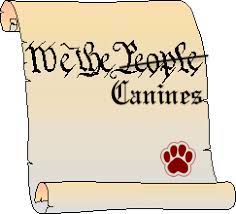Two decades ago, some animal welfare specialists gathered to generate ideas about improving the way that humans manage and treat ‘man’s best friend.’
They were interested in establishing some basic standards in a similar way that the US Declaration of Independence and Constitution defined ‘inalienable rights’ for all people.
 This enthusiastic animal rights group were inspired by Franklin D. Roosevelt who outlined ‘four aspirational freedoms’ in an address to the US Congress in 1941 (freedom of speech, freedom of worship, freedom from want, and freedom from fear). Using Franklin’s ‘freedoms’ as a model, they developed a comprehensive framework that offers ways to care for other living creatures.
This enthusiastic animal rights group were inspired by Franklin D. Roosevelt who outlined ‘four aspirational freedoms’ in an address to the US Congress in 1941 (freedom of speech, freedom of worship, freedom from want, and freedom from fear). Using Franklin’s ‘freedoms’ as a model, they developed a comprehensive framework that offers ways to care for other living creatures.
The group identified “Five Freedoms” that we should offer animals:
- Freedom from thirst, hunger, and malnutrition
- Freedom from thermal and physical discomfort
- Freedom from pain, injury, and disease
- Freedom from fear and distress
- Freedom to express normal behavior
While these ‘freedoms’ are not meant to be the only considerations offered, they describe a beginning foundation for humane management. These 5 continue to inform animal welfare efforts on behalf of domestic and wild animals, from animal husbandry to law enforcement best practices.
In the last decade, we have seen animal rights groups actively lobby to enhance these ‘freedoms’ or ‘rights’ to improve the health, living conditions, space management, food and supplement considerations and overall quality of life for the animals that supply our very industrialized food markets.
Implementation of these ‘Freedoms.’
The first three freedoms are not so difficult to accomplish. With adequate resources and access to appropriate veterinarian care, most of us can keep our dogs physically nourished and physically protected.
The last two freedoms are more of a challenge and remain a continuous work in progress in modern society. Dogs often encounter loud music, noisy machinery, fireworks, or vacuum cleaners—all common in modern homes and communities. Similarly, many dogs spend much of their day crated or kenneled and have few opportunities to forage, explore, and use all their senses normally.
Our family pets and other animals that are a normal part of our daily lives evolve, just as we do, in a changing society. It helps to keep these freedoms in mind. It also remains our responsibility to oversee their health and safety and to try to let them have the freedom to remain true to their nature – as much as possible.
What’s Next? Many of our family pets would probably want the right to vote on the choices we make for them!
[Link]
